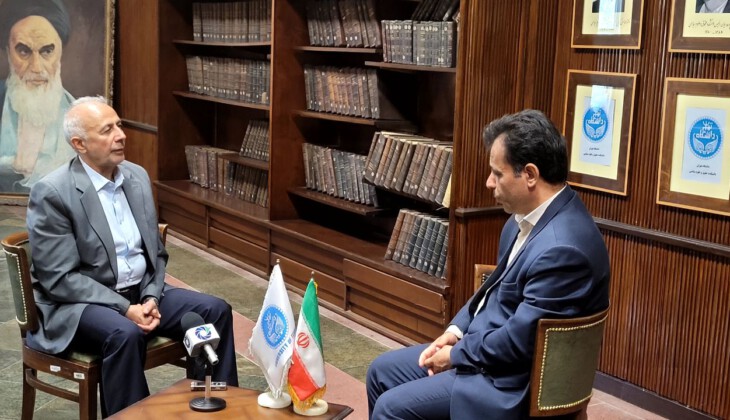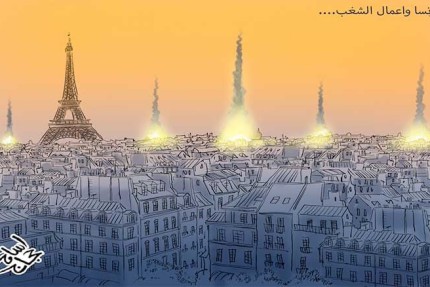part 1
Analysis of the region’s important developments by Dr. Motaghi,

Iran's view on negotiations is step by step balancing and the cost of resistance is lesser than the cost of compromise.
Dr. Ebrahim Motaghi, professor of political science at University of Tehran , analyzed the most important recent political events in the region and the world in an exclusive conversation with Negah No.
With regards to the status of the nuclear negotiations, he said: The negotiations, the re-entry of the US into the JCPOA is one of the main regional and international issues.
He added: When Trump withdrew from the JCPOA, he decided to force Iran to withdraw and gain more concessions related to Iran’s main capability.
This senior regional analyst further stated that Iran had two options. The first option was appeasement and partial acceptance of America’s policy of coercion and pressure.
The second option, based on the principle that the costs of resistance are ultimately lower than the costs of compromise, resulted in Iran choosing
the option of resistance.
Dr. Motaghi continued: The resistance created the basis that threat is serious and permanent therefore to tackle the threat halting and causing a barrier is what should be done.
He continued: Therefore, resistance and deterrence is one of the key indicators of Iran’s policy to continue cooperation with the group of 4 plus one. Iran raised the issue that JCPOA showed that this agreement is fragile and the fragility of an agreement should be amended so that agreement can be respected.
He continued: For this reason, the Iranian approach is a step by step balance view.
Step by step balance means expanding and increasing our power to the extent that we can take away high-risk actions carried out by US, and that is why the negotiations have been prolonged.
The head of the Faculty of Law and Political Sciences of University of Tehransaid: “Today there is a problem called non-JCPOA sanctions. We believe that if there is a desire and intention to remove the sanctions, then the non-JCPOA sanctions should also be removed “.
Therefore, what we should pay attention to today is the non-JCPOA sanctions, and these are of the important and serious topics of discussions of the Vienna and Doha negotiations.
With regards to shifting the negotiation venue from Vienna to Doha, the professor of University of Tehran added: The fact is that the Doha negotiations were conducted based on the agreement of Iran, the desire of the Europeans, the United States, and the support of Qatar. Qatar played the role of facilitator and the European Union, especially Josep Borrell, played the role of mediator.
Dr. Motaghi emphasized: We entered into negotiations in under the above circumstances . Many people believe that the negotiations have failed, I believe that basically the negotiations were not supposed to reach a specific result.
Qatar’s negotiations were to recreate Iran’s dialogue with the European Union and the 4 plus one , which was in a frozen state.
Therefore, the main issue was negotiations to take place and in the near future, second round of Qatar negotiations will be held.
These negotiations were an attempt to restore the Vienna negotiations, as Europe will be experiencing winter in two months, and the main issue will be from where European energy will be supplied . While it is partly supplied by the Arab countries of the Persian Gulf, in this situation, it is becoming necessary for the flow of Iran’s energy and into the global market.
This senior analyst of the region also said:under these circumstances , Iran plays an important role in the energy market and the global economy and the international division of labor and capital.
In response to the question whether it is better for Iran to wait these two months so that it can get more benefits, Dr. Motaghi added: Trying to get more benefits from the negotiating table is great for Iran’s national interests, but what is the guarantee that Iran’s capacity will not be fulfilled by other countries.
Comment
- Donald Trump is trying to impose a new world order.”
- Since the WWII, Europe has been a US Colony
- Trump is Following Washington national politics that were used prior to the WW2
- Trump’s Strategy about Venezuela is Based on James Monroe’s Doctrine
- “Somaliland”, A New US and Zionist regime project: A Unique and Remarkable Geographical Position of the Region
- Donald Trump is trying to impose a new world order.”
- Since the WWII, Europe has been a US Colony
- Trump is Following Washington national politics that were used prior to the WW2
- Trump’s Strategy about Venezuela is Based on James Monroe’s Doctrine
- “Somaliland”, A New US and Zionist regime project: A Unique and Remarkable Geographical Position of the Region
- Trump is Humiliating Europe: America’s Geopolitical Strategy has turned Violent
- video interview with Canadian author
- Trump Is After Reinfiltrating all the South American Countries
- Iraq: A New Power Geometry and the Future Challenges
- Donald Trump is a Complete Lunatic and a Narcissist
- We Do Not Wish to Transform Iraq into a Leverage for Targeting other Countries
- Donald Trump’s Public Support Has Reached its Minimum
- The Al-Shar regime is engaged in Killing the people of Syria instead of fighting Israel
- Donald Trump is trying to impose a new world order.”
- Since the WWII, Europe has been a US Colony
- Trump is Following Washington national politics that were used prior to the WW2
- Trump’s Strategy about Venezuela is Based on James Monroe’s Doctrine
- “Somaliland”, A New US and Zionist regime project: A Unique and Remarkable Geographical Position of the Region
- Trump is Humiliating Europe: America’s Geopolitical Strategy has turned Violent
- video interview with Canadian author
- Trump Is After Reinfiltrating all the South American Countries
- Iraq: A New Power Geometry and the Future Challenges
- Donald Trump is a Complete Lunatic and a Narcissist




